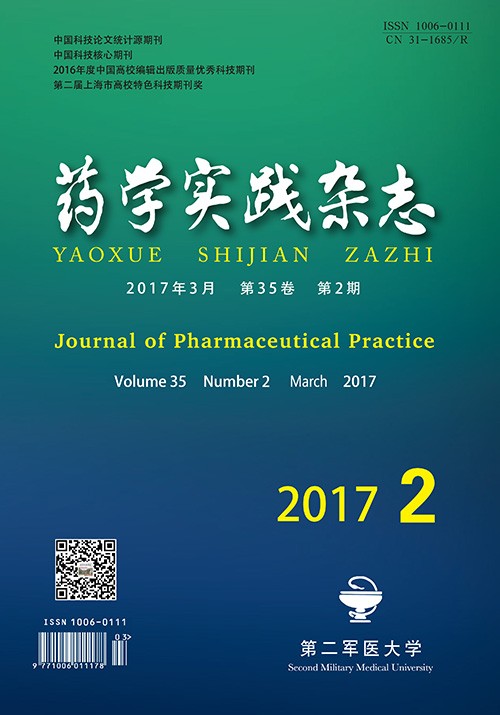LI Yueyang, LIU Min, WANG Hongyu, ZHAO Hongwei. Analysis of medication errors and medication interventions in geriatric inpatients[J]. Journal of Pharmaceutical Practice and Service, 2017, 35(2): 187-190. doi: 10.3969/j.issn.1006-0111.2017.02.024
| Citation:
|
LI Yueyang, LIU Min, WANG Hongyu, ZHAO Hongwei. Analysis of medication errors and medication interventions in geriatric inpatients[J]. Journal of Pharmaceutical Practice and Service, 2017, 35(2): 187-190. doi: 10.3969/j.issn.1006-0111.2017.02.024
|
Analysis of medication errors and medication interventions in geriatric inpatients
- Received Date: 2016-05-26
- Rev Recd Date:
2017-01-12
-
Abstract
Objective To explore the role of clinical pharmacists in pharmaceutical care and medication errors prevention in geriatric inpatients. Methods 702 geriatric inpatients hospitalized from May 2015 to April 2016 were enrolled in this study. The patients received medication instruction and monitoring. Medication errors and intervention results were summarized and analyzed. Results Clinical pharmacist successfully made 625 interventions, which represented for 41.32% of all the cases collected. After intervention, the rate of corrections was increased up to 90.63%. The top three medication errors were administration time/occasion errors (36.64%), medication compliance errors (23.68%) and administration techniques errors (14.56%). Conclusion Clinical pharmacists play an important role in medication error prevention through medication interventions. By providing rational drug use suggestions and directions, clinical pharmacists can reduce the medication error rate and improve the drug therapy effectiveness.
-
References
|
[1]
|
王育琴.中国用药错误管理专家共识[J].药物不良反应杂志,2014,16(6):321-326. |
|
[2]
|
梁海涛,施孝金,钟明康.用药错误及其预防[J].上海医药,2011,32(4):161-163. |
|
[3]
|
杨良东.老年人内科疾病分布及临床用药特点[J].中国中医药咨讯,2012,4(5):191. |
|
[4]
|
中国成人血脂异常防治指南制订联合委员会.中国成人血脂异常防治指南[J].中华心血管病杂志,2007,35(5):390-419. |
|
[5]
|
文海棠,陈淑婷,汤异玲.依据时辰药理指导临床合理用药[J].中国药业,2011,20(2):63-64. |
|
[6]
|
Konstantinides SV, Torbicki A, Agnelli G, et al.2014 ESC guidelines on the diagnosis and management of acute pulmonary embolism[J].Eur Heart J,2014,35(43):3033-3073. |
|
[7]
|
U.S.Food and Drug Administration. FDA Drug Safety Communication:Low magnesium levels can be associated with longterm use of proton pump inhibitor drugs (PPIs)[EB/OL]. http://www.fda.gov/Drugs/DrugSafety/ucm245011.htm |
|
[8]
|
American Geriatrics Society 2015 updated Beers criteria for potentially inappropriate medication use in older adults[J].J Am Geriatr Soc,2015,63(11):2227-2246. |
|
[9]
|
康伟珍.临床使用中药注射剂应注意的问题[J].中国现代药物应用,2009,3(15):150-151. |
|
[10]
|
van Giezen JJ,Sidaway J,Glaves P,et al.Ticagrelor inhibits adenosine uptake in vitro and enhances adenosine-mediated hyperemia responses in a canine model[J].J Cardiovasc Pharmacol Ther,2012,17(2):164-172. |
|
[11]
|
中华医学会心血管病学分会, 中华心血管病杂志编辑委员会.中国心力衰竭诊断和治疗指南2014[J].中华心血管病杂志,2014,42(2):98-122. |
|
[12]
|
Ogawa E,Sakakibara R,Kishi M,et al.Constipation triggered the malignant syndrome in Parkinson's disease[J].Neurol Sci,2012,33(2):347-350. |
|
[13]
|
Perry D,Birthi P,Salles S,et al.Neuroleptic malignant syndrome associated with the use of carbidopa/levodopa for dystonia in persons with cerebral palsy[J].PMR,2012,4(5):383-384. |
|
[14]
|
Bonnici A,Ruiner CE,St-Laurent L,et al.An interaction between levodopa and enteral nutrition resulting in neuroleptic malignant-like syndrome and prolonged ICU stay[J].Ann Pharmacother,2010,44(9):1504-1507. |
|
[15]
|
邹箴蕾.31例伏立康唑不良反应/事件文献分析[J].中国药物警戒,2013,10(10):623-626. |
-
-
Proportional views

-







 DownLoad:
DownLoad: